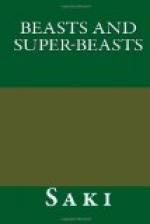“Is anything the matter, Martha?” asked the young woman.
“’Tis death, ’tis death a-coming,” answered the quavering voice; “I knew ’twere coming. I knew it. ’Tweren’t for nothing that old Shep’s been howling all morning. An’ last night I heard the screech-owl give the death-cry, and there were something white as run across the yard yesterday; ’tweren’t a cat nor a stoat, ’twere something. The fowls knew ’twere something; they all drew off to one side. Ay, there’s been warnings. I knew it were a-coming.”
The young woman’s eyes clouded with pity. The old thing sitting there so white and shrunken had once been a merry, noisy child, playing about in lanes and hay-lofts and farmhouse garrets; that had been eighty odd years ago, and now she was just a frail old body cowering under the approaching chill of the death that was coming at last to take her. It was not probable that much could be done for her, but Emma hastened away to get assistance and counsel. Her husband, she knew, was down at a tree-felling some little distance off, but she might find some other intelligent soul who knew the old woman better than she did. The farm, she soon found out, had that faculty common to farmyards of swallowing up and losing its human population. The poultry followed her in interested fashion, and swine grunted interrogations at her from behind the bars of their styes, but barnyard and rickyard, orchard and stables and dairy, gave no reward to her search. Then, as she retraced her steps towards the kitchen, she came suddenly on her cousin, young Mr. Jim, as every one called him, who divided his time between amateur horse-dealing, rabbit-shooting, and flirting with the farm maids.
“I’m afraid old Martha is dying,” said Emma. Jim was not the sort of person to whom one had to break news gently.
“Nonsense,” he said; “Martha means to live to a hundred. She told me so, and she’ll do it.”
“She may be actually dying at this moment, or it may just be the beginning of the break-up,” persisted Emma, with a feeling of contempt for the slowness and dulness of the young man.
A grin spread over his good-natured features.
“It don’t look like it,” he said, nodding towards the yard. Emma turned to catch the meaning of his remark. Old Martha stood in the middle of a mob of poultry scattering handfuls of grain around her. The turkey-cock, with the bronzed sheen of his feathers and the purple-red of his wattles, the gamecock, with the glowing metallic lustre of his Eastern plumage, the hens, with their ochres and buffs and umbers and their scarlet combs, and the drakes, with their bottle-green heads, made a medley of rich colour, in the centre of which the old woman looked like a withered stalk standing amid a riotous growth of gaily-hued flowers. But she threw the grain deftly amid the wilderness of beaks, and her quavering voice carried as far as the two people who were watching her. She was still harping on the theme of death coming to the farm.




